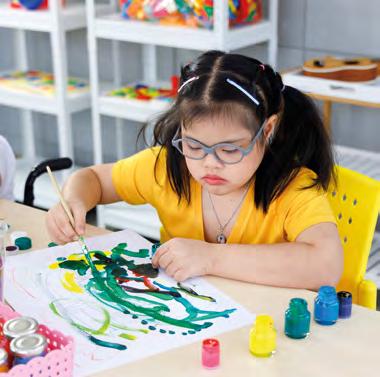
3 minute read
Supporting pupils with autism; a parent and teacher view
We hear from Eve Godwin, educator and parent, on strategies to support pupils with autism.
I’ve worked in education for 15 years now, as a class teacher, a reading recovery teacher, a SENCO and now a specialist teacher. Over the years, education and society have undergone huge changes in terms of understanding neurodivergence. It’s not always easy to keep up and, as a parent of two neurodivergent children and an education professional, I still feel I’m learning more every day and I’m sure I will continue to do so.
Looking back to my earlier days in teaching and as a new SENCO, there are some things I wish I had known, and many things I wish I would have done differently to support the neurodivergent pupils I worked with and their families. We know that more needs to be done in society to fully embrace the strengths of the neurodivergent population; I can certainly say I’m amazed by my neurodivergent children every day and I want to see an educational system that allows them and their peers to flourish and thrive. To achieve that, we need to offer the support and guidance that embraces difference and encourages autistic identity and that helps ensure schools are not scared to try doing things differently.
There are two aspects, in my opinion, that schools need to think about to support their autistic pupils. First is to audit the environment and everyone within it; the sensory environment, the routines, the demands and the pupils and staff. Second, schools must support pupils with autism, enabling them to communicate, to self-advocate so they are able to say what they need and to develop strategies that they can use when the world gets difficult. If you take my first point, historically there has been a belief that we need to put strategies in place to help pupils with autism develop skills that are more neurotypical, such as advising social communication groups based on a neurotypical communication style.

Eve is the lead for Autism for the Specialist Teaching Service in Warwickshire. She became passionate about supporting pupils with autism when her eldest daughter was diagnosed at age nine after several years of struggling at school.
This is done with the conviction that we need to make our pupils with autism more resilient through exposure. Research, and more importantly, the autistic voice, now tells us that this approach can have long-term implications for our pupils. Instead, we need to advise schools on how to make sure everyone’s communication style is accepted and valued; that relationships are built in different ways and mutually beneficial relationships come from mutual understanding. The key to this is peer and staff awareness. To enable the environment to be right for pupils with autism, we need to ensure that they are understood and valued by the staff that work with them and the peers that work alongside them.
My second point is about building a toolkit. We all have one. It might be that when you feel overloaded you go on a walk, you call a friend, or you do an activity or hobby that you enjoy. All pupils need that toolkit, pupils on the autism spectrum even more so, and it’s the role of everyone working together to support them to develop that. It’s about recognising how they are feeling, about them being able to communicate that in a way that is right for them, about them being understood by others and then having strategies to support them with that feeling.
I believe that when these elements are put together by everyone around that pupil and with the pupil themselves, we can support a safe environment in which pupils can learn and feel a sense of belonging.
I’ve produced some tips that I think are helpful when advising schools on supporting their pupils. It’s not an exhaustive list and I’m not pretending to be an absolute source of knowledge that always gets it right, but I am someone who aims to do this, and I think that’s what it is all about.
This article first appeared on the website of Autistic Girls Network: https://autisticgirlsnetwork.org/

Listen – listen to parents and listen to pupils. Working together means open communication and that includes an ability and willingness to listen.
DIRM – Does It Really Matter? What matters and is important to pupils with autism and what is important simply because it’s the way it’s normally done. Teach with the outcome in mind; the journey pupils with autism take you on is usually much more exciting than one you could have planned for. Involve individuals with autism in sensory audits of the environment – if you don’t, you will miss things. Teach strategies about recognising anxiety and managing it, provide opportunities throughout the school day to empty their stress bucket. Make reasonable adjustments so that each pupil has equal access to learning in an environment in which they feel safe, secure and valued. Never make assumptions. Take the time to stop, observe and listen.
I’m sure more things will be added to the list as I continue in my career, and we hear more from advocates for pupils with autism who share their journey and learning with us, but I will end on the words of my child … “it’s not hard – just do what I need to be happy”.














